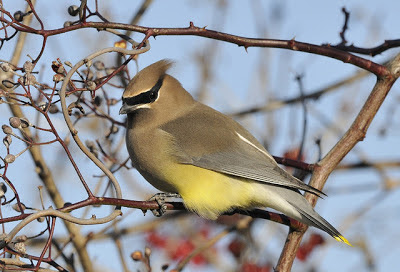 |
| Cedar Waxwing / Photo by Bill Thompson (USFWS) |
- A study of shorebirds showed that sex roles are dependent on the ratio between adult males and adult females. When males outnumber females, males tend to take the primary role in caring for offspring.
- The Gunnison Sage-Grouse may be the rarest bird species in the United States, with only about 5,000 individuals in the wild. This bird species was only discovered 13 years ago and is one of many cryptic species.
- A study found that ambient noise reduces avian diversity in cities, and loud ambient noise is especially bad for birds with lower pitches in their songs.
- Some parrots are willing to make trades to get better snacks.
- A recent expedition into Cambodia's Virachey National Park found 163 species of birds, including Slaty-backed Forktail, Yellow-vented Green Pigeon, and Mustached Barbet.
- Seabirds are being killed by another oil spill in the UK, this time in Yorkshire.
- 100 years ago this week, a writer in The Guardian celebrated seeing the first Chiffchaff of spring.
- Not Exactly Rocket Science: The Rise and Fall of Four-Winged Birds
- Safari Ecology: Common birds: Red-billed Quelea, commonest bird in the world?
- Extinction Countdown: Google Earth Inspires Rediscovery of Lost Butterfly Species
- The Meadowlands Blog: Great Seal of New Jersey
- The Loom: Resurrecting A Forest
- The Scicurious Brain: Plants give bees a caffeine buzz
- Laelaps: The Promise and Pitfalls of Resurrection Ecology
- mocosoco Birds: Pacific Loon updates; other field notes, Mar. 12, 2013
- The Rattling Crow: There is more to the eyes of the Robin
- Temperatures are rising faster in the Arctic than elsewhere on the planet, and the resulting ecosystem changes are visible from space. Tall shrubs and trees are starting to invade the formerly treeless tundra.
- Southwestern cities like Phoenix will face severe challenges as the climate continues to warm, to the point that they may not be able to survive in the face of unmitigated climate change.
- A new study reconstructs the global climate over the past 11,300 years and finds that the Earth is warming at an unprecedented pace.
- A project needs volunteers to find wildlife crossings in northern New Jersey.
- The UK environment minister is blocking a Europe-wide pesticide ban to protect bees even though it has widespread public support.
- It appears that invasive Asian long-horned beetles have been extirpated from New Jersey.
- Monarch butterfly numbers are down again this year, due to drought and changes in agricultural practices.
- Despite annual monsoons, much of India is struggling to provide enough clean drinking water to its growing population. Gujarat is planning to cover its canals with solar panels to reduce evaporation (and generate power, of course).
- CITES has so far been ineffective at stopping the illegal ivory trade. In other CITES news, five shark species have won protection under CITES from fin harvesting for shark fin soup and dozens of tree species gained new protections.
- Red tide is currently killing dozens of manatees in Florida.
- Thanks to budget sequestration, Yellowstone National Park will be opening later than usual this year because it lacks the money to pay for plowing the roads.
- Some scientists think that oil from the Deepwater Horizon well may have mixed with plankton and sediments and precipitated to the ocean floor in a "dirty blizzard" effect. That may account for the oil that went missing after the spill.
- A contagious cancer is wiping out the Tasmanian Devil population, but scientists are getting closer to understanding how it works (hopefully in time to prevent the species's extinction).



